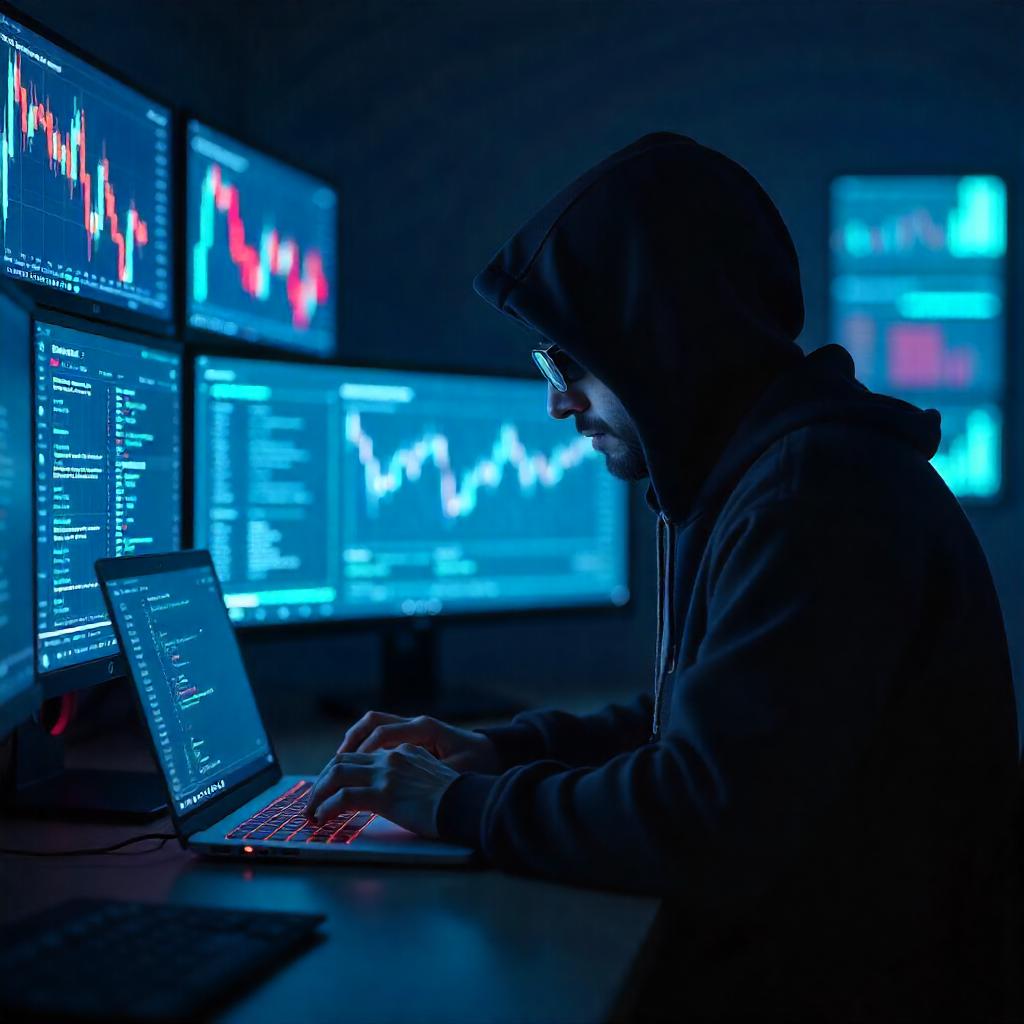In the ever-evolving world of decentralized finance (DeFi), security remains a paramount concern. Recent developments have highlighted a growing threat from state-sponsored actors, notably North Korean hackers, who have increasingly targeted DeFi protocols. These cyberattacks are not only sophisticated but also strategically aimed at exploiting vulnerabilities within the decentralized ecosystem.
North Korea’s involvement in cyberattacks is well-documented, with groups like the Lazarus Group and APT38 being linked to significant breaches in the cryptocurrency sector. For instance, in 2025, the FBI attributed a massive $1.5 billion theft from the Bybit exchange to North Korean hackers, a breach that stands as one of the largest in the history of cryptocurrency exchanges.
The motivations behind these attacks are multifaceted. While some may view them as politically motivated acts of cyber warfare, others argue that they serve as a means for North Korea to circumvent international sanctions and fund its regime. The decentralized nature of DeFi platforms, with their reliance on smart contracts and lack of central authority, makes them particularly susceptible to such exploits.
Understanding the tactics employed by these hackers is crucial for developing effective countermeasures. Recent reports indicate that North Korean hackers have used fake job applications to deploy malware targeting crypto professionals, aiming to infiltrate systems and steal sensitive information.
This article delves into the specifics of these cyberattacks, examining the methods used, the actors involved, and the implications for the DeFi ecosystem. By shedding light on these threats, we aim to equip DeFi developers, investors, and users with the knowledge to better protect themselves and the platforms they engage with.
The Scale of the Threat
North Korean hackers have significantly impacted the DeFi ecosystem, with several high-profile incidents in 2025.
Bybit Hack – $1.5 Billion Stolen
On February 21, 2025, the FBI confirmed that North Korean hackers, identified as the Lazarus Group and its subgroup TraderTraitor, stole approximately $1.5 billion in Ethereum from the Dubai-based cryptocurrency exchange Bybit. The hackers exploited vulnerabilities in Bybit’s cold wallet transfer process, manipulating transaction data to redirect funds to unauthorized addresses. The stolen assets were rapidly laundered across multiple blockchains, raising concerns about the security of centralized exchanges.
BitoPro Exchange – $11.5 Million Stolen
In May 2025, the Lazarus Group targeted Taiwan’s BitoPro exchange, stealing approximately $11.5 million. The exchange detected suspicious outflows and initiated an internal investigation, highlighting the group’s persistent targeting of cryptocurrency platforms.
Other Notable Incidents
In addition to these major breaches, North Korean hackers have been linked to several other incidents:
- WazirX Exchange: Approximately $235 million stolen.
- DMM Bitcoin Exchange: $308 million stolen.
- Atomic Wallet: Over $100 million stolen.
These incidents underscore the group’s capability and intent to disrupt the cryptocurrency sector.
Methods of Attack
North Korean hackers have refined their tactics to infiltrate DeFi protocols and cryptocurrency firms, employing sophisticated methods to compromise systems and steal sensitive data.
Fake Job Applications and Deepfake Interviews
A prevalent strategy involves creating fake job opportunities to lure crypto professionals into executing malicious files. For instance, the Lazarus Group has used deepfake technology to conduct fake video interviews, tricking candidates into running malware disguised as technical assessments. This malware, such as the Python-based PylangGhost, is capable of stealing credentials from over 80 browser extensions, including MetaMask and 1Password, and establishing persistent remote access to the compromised systems.
Fake Crypto Firms and AI-Generated Identities
In a more elaborate scheme, North Korean hackers have registered fake cryptocurrency companies in the U.S., such as Blocknovas and Softglide, using AI-generated identities to appear legitimate. These fake firms distribute malware through job postings, targeting crypto developers to steal credentials and gain unauthorized access to networks. The FBI has seized the domain associated with Blocknovas as part of efforts to disrupt these activities.
Malware Delivered via Malicious Attachments
Another method involves sending phishing emails with attachments that appear to be legitimate documents but contain malware. For example, in a campaign targeting Radiant Capital, hackers sent a PDF disguised as a report, which, when opened, deployed a backdoor malware named INLETDRIFT on macOS devices. This malware allowed the attackers to exfiltrate sensitive information and potentially facilitate future attacks.
Exploiting Remote Work Infrastructure
The shift to remote work has provided additional avenues for cyberattacks. Hackers have exploited this by infiltrating companies through remote hiring processes, using stolen identities and AI tools to pass interviews and gain employment. Once hired, they request company-issued laptops to be sent to addresses they control, setting up “laptop farms” to maintain persistent access to the company’s network.
The Actors Behind the Attacks
North Korean cyberattacks on DeFi protocols are primarily attributed to state-sponsored hacking groups operating under the Reconnaissance General Bureau (RGB), North Korea’s primary intelligence agency. These groups are highly organized and specialize in various forms of cyber operations, including espionage, data theft, and financial cybercrime.
Lazarus Group
The Lazarus Group, also known as Hidden Cobra, is a well-known cybercrime organization linked to North Korea. Established as early as 2007, it has been responsible for numerous high-profile cyberattacks worldwide. The group is believed to operate under the 110th Research Center, 3rd Bureau of the RGB. Its activities encompass cyber espionage, data theft, monetary heists, and destructive malware operations.
In 2025, the Lazarus Group, operating under the alias “TraderTraitor,” executed the largest cryptocurrency heist in history by stealing approximately $1.5 billion in Ethereum from the Bybit exchange. The FBI has confirmed North Korea’s involvement in this attack.
Andariel
Andariel, also known as APT45 or Silent Chollima, is another hacking group affiliated with North Korea’s RGB. It specializes in cyber espionage and has targeted various sectors, including defense, technology, and healthcare. Notably, in 2024, Andariel was charged in the U.S. for deploying ransomware attacks on hospitals and healthcare providers, using the proceeds to fund further cyber intrusions into defense and technology organizations worldwide.
Andariel’s operations are characterized by their stealthy nature, focusing on reconnaissance and mapping vulnerabilities within target networks.
Geopolitical Implications
North Korea’s cyberattacks on decentralized finance (DeFi) platforms are not merely criminal endeavors; they are intricately linked to the nation’s broader geopolitical strategies. These operations serve multiple purposes: circumventing international sanctions, financing state activities, and asserting cyber dominance.
Circumventing Sanctions
International sanctions have significantly impacted North Korea’s economy, particularly in sectors like banking and trade. Cryptocurrency, with its decentralized nature, offers a means to bypass these financial restrictions. By targeting DeFi platforms, North Korean hackers can illicitly acquire digital assets, thereby accessing global financial systems without the need for traditional banking intermediaries. This not only undermines the effectiveness of sanctions but also provides North Korea with a financial lifeline to support its regime.
Financing State Activities
The funds obtained through these cyberattacks are often funneled into state-sponsored programs, including the development of weapons of mass destruction. A United Nations report indicates that up to 40% of North Korea’s nuclear program is financed through cyber means. The Lazarus Group, a North Korean state-sponsored hacking organization, has been instrumental in executing these high-profile cyberattacks, including the record $1.5 billion theft from Bybit.
Asserting Cyber Dominance
Beyond financial gains, these cyberattacks serve as a demonstration of North Korea’s growing cyber capabilities. The establishment of “Research Center 227” underscores the nation’s commitment to enhancing its cyber warfare capabilities. This center focuses on developing offensive programs to steal information and disrupt adversary networks, signaling North Korea’s intent to assert its presence in the global cyber domain.
Impact on the DeFi Ecosystem
North Korean cyberattacks have profoundly affected the decentralized finance (DeFi) sector, exposing critical vulnerabilities and prompting urgent calls for enhanced security measures.
Financial Losses and Operational Disruptions
The most significant breach occurred in February 2025, when North Korean hackers, identified as TraderTraitor and the Lazarus Group, stole approximately $1.5 billion in Ethereum from the Bybit exchange. This incident is considered the largest cryptocurrency heist in history. The stolen funds were rapidly laundered across multiple blockchains, raising concerns about the effectiveness of current security protocols in DeFi platforms.
In 2024, North Korean-linked hackers executed 47 crypto heists, amassing over $1.3 billion in illicit gains. These funds were often funneled through decentralized exchanges and mixers, complicating efforts to trace and recover the stolen assets.
Erosion of Trust and Investor Confidence
The frequency and scale of these attacks have eroded trust in DeFi platforms. Investors and users are increasingly concerned about the security of their assets, leading to a decline in participation and capital inflow into DeFi projects. This loss of confidence threatens the foundational principles of decentralization and permissionless innovation that DeFi was built upon.
Regulatory Scrutiny and Compliance Challenges
The involvement of state-sponsored actors like North Korea has attracted heightened regulatory scrutiny. Governments and financial authorities are intensifying efforts to enforce compliance with existing sanctions and are considering the implementation of stricter regulations to prevent illicit activities within the crypto space. This regulatory pressure poses challenges for DeFi projects striving to maintain their decentralized ethos while ensuring compliance.
Security Vulnerabilities and Exploitation
North Korean hackers have exploited specific vulnerabilities within DeFi protocols, including:
- Manipulation of Smart Contracts: By exploiting flaws in smart contract code, attackers can redirect funds or execute unauthorized transactions.
- Social Engineering Attacks: Impersonating legitimate entities, hackers have deceived individuals into executing malicious code, leading to unauthorized access and theft.
- Use of Mixers and Privacy Tools: Employing tools like Tornado Cash, attackers obfuscate the origin of stolen funds, complicating tracking and recovery efforts.
These tactics highlight the need for robust security audits and the implementation of best practices in smart contract development to mitigate potential risks.
Mitigation Strategies
In light of the escalating threat posed by North Korean cyberattacks on DeFi protocols, it is imperative for both developers and users to implement robust security measures.
For DeFi Developers
- Comprehensive Smart Contract Audits: Regular and thorough audits by reputable third-party firms can identify and rectify vulnerabilities before they can be exploited.
- Implementation of Multi-Factor Authentication (MFA): Requiring multiple forms of verification can significantly reduce the risk of unauthorized access.
- Adoption of Zero-Trust Security Models: Assuming that threats may exist both outside and inside the network, and verifying every request as though it originates from an open network, can enhance security.
- Regular Penetration Testing: Simulating attacks on the system can help identify and fix potential security weaknesses.
- Secure Development Practices: Educating developers on secure coding practices and common vulnerabilities can prevent the introduction of security flaws.
For DeFi Users
- Vigilance Against Phishing Attempts: Users should be cautious of unsolicited communications and verify the authenticity of requests before providing sensitive information.
- Utilization of Hardware Wallets: Storing assets in hardware wallets can provide an additional layer of security against online threats.
- Regular Monitoring of Accounts: Frequent checks can help detect unauthorized activities promptly.
- Awareness of Social Engineering Tactics: Understanding common manipulation techniques can help users avoid falling victim to scams.
- Keeping Software Up to Date: Ensuring that all software is current can protect against known vulnerabilities.
Regulatory Responses
The unprecedented scale of North Korean cyberattacks on decentralized finance (DeFi) platforms has prompted a significant shift in global regulatory approaches. Governments and international bodies are intensifying efforts to combat state-sponsored cybercrime, focusing on enhancing cybersecurity frameworks, enforcing stricter compliance measures, and fostering international cooperation.
United States: Strengthening Compliance and Enforcement
In response to the $1.5 billion Bybit hack attributed to North Korean hackers, the United States has taken proactive steps to bolster its cybersecurity posture:
- Enhanced KYC and AML Regulations: The U.S. is implementing more stringent Know Your Customer (KYC) and Anti-Money Laundering (AML) regulations for cryptocurrency platforms. These measures include mandatory identity verification before transactions and increased monitoring of blockchain activity to detect illicit fund movements.
- FBI Seizures and Sanctions: The Federal Bureau of Investigation (FBI) has seized domains associated with North Korean cyber actors, such as Blocknovas, which were used to distribute malware through fake job postings. Additionally, the U.S. Department of the Treasury’s Office of Foreign Assets Control (OFAC) has sanctioned entities linked to the Lazarus Group, aiming to disrupt their financial activities.
European Union: Implementing the Cyber Resilience Act
The European Union has enacted the Cyber Resilience Act, which imposes comprehensive cybersecurity requirements on information technology products, including those used in DeFi platforms:
- Vulnerability Coordination: The Act mandates coordinated vulnerability disclosure, requiring vendors to report and address security flaws promptly. This measure aims to enhance the overall security posture of digital products and services.
- Enhanced Security Standards: The Act establishes baseline security standards for digital products, compelling manufacturers to integrate robust security features throughout the product lifecycle.
United Nations: Advancing Global Cybercrime Cooperation
In December 2024, the United Nations adopted the Convention against Cybercrime, aiming to facilitate international cooperation in combating cybercrime:
- International Cooperation: The Convention establishes frameworks for mutual legal assistance and extradition, enhancing the ability of countries to collaborate in investigating and prosecuting cybercrimes.
- Human Rights Considerations: While the Convention addresses cybercrime, it has faced criticism for potentially expanding surveillance capabilities without adequate human rights safeguards.
Global Financial Institutions: Strengthening Oversight
International financial institutions are intensifying efforts to monitor and regulate cryptocurrency activities:
- G7 Summit Discussions: The Group of Seven (G7) nations are considering discussions on North Korea’s cyberattacks and crypto thefts at upcoming summits, aiming to coordinate a unified response to these threats.
- Enhanced Monitoring: Financial institutions are enhancing monitoring of cryptocurrency transactions to detect and prevent illicit activities, including money laundering and sanctions evasion.
Final Note
North Korea’s state-sponsored cyberattacks on decentralized finance (DeFi) platforms have escalated to unprecedented levels in 2025, with the $1.5 billion Bybit hack marking the largest cryptocurrency heist in history. These attacks, attributed to the Lazarus Group and its subgroups, have exposed significant vulnerabilities within the DeFi ecosystem, highlighting the urgent need for enhanced security measures.
The methods employed by these hackers, including fake job applications, deepfake interviews, and the establishment of fraudulent U.S.-based companies, demonstrate a sophisticated and evolving threat landscape. The geopolitical implications are profound, as these cyberattacks serve not only as financial crimes but also as tools for circumventing international sanctions and funding state activities.
In response, global regulatory bodies are intensifying efforts to combat such cyber threats, with the United States, European Union, and United Nations implementing stricter cybersecurity frameworks and fostering international cooperation. However, the decentralized nature of DeFi platforms presents unique challenges in enforcing these regulations.
For DeFi developers and users, adopting robust security practices is paramount. This includes conducting comprehensive smart contract audits, implementing multi-factor authentication, and remaining vigilant against phishing attempts. Additionally, staying informed about the latest cybersecurity threats and collaborating with industry peers can enhance collective resilience against such attacks.
As the DeFi space continues to evolve, it is imperative that all stakeholders—developers, users, and regulators—work collaboratively to fortify the ecosystem against state-sponsored cyber threats. Only through collective effort can the integrity and security of decentralized finance be ensured in the face of such sophisticated adversaries.





